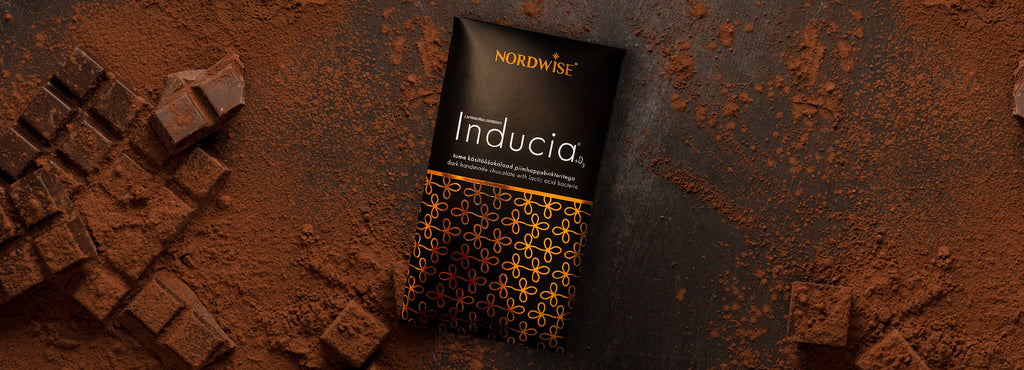What makes Nordwise® dark INDUCIA® craft chocolate with lactic acid bacteria and vitamin D special?
The ideal balance of sweet and bitter in INDUCIA® dark artisan chocolate with 72% cocoa content offers a first-class taste pleasure. In addition, the contained INDUCIA® lactic acid bacteria caress the stomach. The interaction between cocoa and INDUCIA® lactic acid bacteria makes it even healthier than regular dark chocolate!
The special feature of INDUCIA® dark craft chocolate is that it contains Lactobacillus plantarum INDUCIA® lactic acid bacteria discovered and studied in Estonia, which increase the total number of beneficial lactobacilli in the intestine and help maintain and restore the normal microbiota of the intestine. As a result , the body's natural defenses increase and the risk of food infections decreases. The INDUCIA® bacterium has demonstrated antioxidant activity and the ability to reduce LDL-cholesterol levels in clinical trials. The same properties have also been found in the bioactive compounds in dark chocolate . Thus, INDUCIA® chocolate has a synergistic effect.
The INDUCIA® bacterium has been studied for more than 15 years by the research and development center BioCC OÜ (Bio-kompetentsikeskus) in cooperation with researchers from the University of Tartu. The INDUCIA® bacterium and its functional properties are internationally patented and tested in scientific and clinical studies in which more than 500 Estonian people have participated (US patent US10272122 , European patent EP2288360 ).
The antioxidant potential of INDUCIA® chocolate is the carrier of several healthy properties. Cocoa, the main component of chocolate, contains biologically active compounds. There are especially many flavonoids with antioxidant properties , which are found in cocoa even more than in tea or red wine. Antioxidants are compounds that protect body cells from the harmful effects of reactive particles. In the absence of antioxidants, the possibility of long-term and excessive oxidative stress increases, which is a contributing factor to cardiovascular diseases, neurodegenerative diseases, premature aging and tumors. Due to the high cocoa content of INDUCIA® craft chocolate, it has significantly more antioxidants than milk chocolate. At the same time, INDUCIA® dark chocolate has about 45% less sugar than regular milk chocolate. INDUCIA® chocolate has a naturally high fiber content. The added vitamin D contributes to the normal functioning of the immune system and helps to maintain normal bones.
How much INDUCIA® chocolate should you eat?
For the beneficial effects of dark chocolate to manifest, researchers recommend eating 25 g of it per day . This is 6 squares or a quarter of a bar of INDUCIA® chocolate. At the same time, it assumes that the rest of the diet is in order - the menu contains a sufficient amount of vegetables and fruits (minimum 300 g of vegetables and 200 g of fruits per day) and other sweets, bakery products and sweet soft drinks are consumed to a minimum. In case of unhealthy diet, low physical activity and/or overweight, limit yourself to 3 squares of INDUCIA® chocolate per day.
Immunity
It has long been known that the community of microbes in the human gut, or microbiota, affects the functioning of the immune system. INDUCIA® chocolate enriches the intestine with beneficial lactobacilli, and in addition , cocoa flavanols promote the growth of lactobacilli and bifidobacteria. A study by Spanish researchers provides an overview of the mechanisms by which bioactive substances found in cocoa can have an immune system modulating effect by improving the immune response on the one hand and reducing hypersensitivity reactions on the other.
Diseases of the heart and blood vessels
The effect of consuming dark chocolate on heart and vascular diseases has been studied the most. Dark chocolate is thought to have the following effects:
- Antioxidant effect (it is further strengthened by INDUCIA® bacteria)
- Lowers blood pressure
- Slows the development of atherosclerosis
- Has an anti-clotting effect
- Has an anti-inflammatory effect
An article published in The Netherlands Journal of Medicine summarizes the mechanisms by which moderate consumption of dark chocolate can have an inhibitory effect on the onset and development of cardiovascular diseases through the mechanisms listed above.
A meta-analysis published in The British Medical Journal shows that chocolate consumption can reduce the risk of heart disease by a third. However, they recommend further experimental studies to confirm whether chocolate consumption is beneficial for the heart.
Research has found that moderate consumption of dark chocolate protects blood vessels from atherosclerosis through the following mechanisms
- dilates blood vessels by producing nitric oxide (NO)
- lowers cholesterol levels
- helps stabilize blood sugar levels in type 2 diabetes
Since the INDUCIA® bacterium has demonstrated antioxidant properties and the ability to lower LDL cholesterol levels in clinical trials, it supports the potential of dark chocolate to prevent cardiovascular disease.
A stroke
British researchers conducted a study of 25,000 people and found that those who ate moderate amounts of chocolate were 21% less likely to have a stroke than those who did not.
Cholesterol
A meta-analysis published in the European Journal of Clinical Nutrition shows that regular and moderate consumption of dark chocolate is associated with lower levels of both total cholesterol and LDL cholesterol, known as bad cholesterol. Estonian lactic acid bacteria added to INDUCIA® chocolate has also lowered LDL cholesterol levels in volunteers participating in clinical trials.
Diabetes
Although it is recommended to limit sweets in the case of diabetes, dark chocolate may have protective effects against diabetes. A meta-analysis published in 2017 showed that moderate consumption of chocolate may be associated with a lower risk of developing diabetes (maximum effect when consuming 60 g of dark chocolate per week) . Experiments with cell culture also suggest that the flavonoid epicatechin contained in chocolate reduces oxidative stress and thereby improves pancreatic beta-cell survival and insulin secretion .
Cognition or cognitive function
Since ancient times, people have noticed the ability of dark chocolate to stimulate mental abilities. Today, it has also been scientifically confirmed. A 2016 study published in the journal Appetite shows that eating chocolate at least once a week can improve cognitive function . In addition to flavonoids, cocoa and therefore also dark chocolate contain other bioactive compounds (methylxanthine, theobromine and caffeine), which also have a positive effect on mental capacity. It is possible that regular consumption of flavonoids contained in cocoa also helps to slow down age-related decline in mental capacity, but longer-term clinical studies are needed to prove this. In addition, researchers are investigating whether cocoa extract could have an effect that inhibits the development of Alzheimer's disease .
A sporty lifestyle
Findings published in The Journal of the International Society of Sports Nutrition suggest that dark chocolate can improve oxygen availability during exercise . According to researchers, the effect of dark chocolate lies in the content of flavanols, which increase the release of nitric oxide (NO), which relaxes blood vessels, in the body.
Consuming INDUCIA® dark artisanal chocolate can therefore have the following benefits:
- Antioxidant effect
- A stronger immune system
- Lower risk of cardiovascular disease, lower cholesterol
- Positive effect on mental capacity
- Helps improve athletic performance
List of literature
M.Mikelsaar et al. " Lactobacillus plantarum Inducia DSM 21379 as enhancer of cellular immunity, hypocholesterolemic and anti-oxidative agent and antimicrobial agent against Clostridium difficile". US patent US10272122 , issued on 04/30/2019
"Isolated Lactobacillus plantarum strain Inducia DSM 21379 as probiotic that enhances natural immunity and food products and medicinal preparations comprising it". European patent EP2288360 , issued on 14.12.2011.
Scientific Opinion on the modification of the authorization of a health claim related to cocoa flavanols and maintenance of normal endothelium-dependent vasodilation pursuant to Article 13(5) of Regulation (EC) No 1924/2006 following a request in accordance with Article 19 of Regulation (EC) No 1924/2006. EFSA Journal. 2014; 12(5) doi.org/10.2903/j.efsa.2014.3654
M. Rätsep, S. Kõljalg, E. Sepp, I. Smidt, K. Truusalu, E. Songisepp, J. Stsepetova, P. Naaber, RH Mikelsaar, M. Mikelsaar. A combination of the probiotic and prebiotic product can prevent the germination of Clostridium difficile spores and infection. Anaerobic. 2017; 47: 94-103
Cocoa Has More Phenolic Phytochemicals and a Higher Antioxidant Capacity than Teas and Red Wine. K.W Lee, YJ Kim, HJ Lee, and CY Lee. J. Agric. Food Chem. 2003; 51(25): 7292–7295. doi: 10.1021/jf0344385
Prebiotic evaluation of cocoa-derived flavanols in healthy humans by using a randomized, controlled, double-blind, crossover intervention study. X. Tzounis, A. Rodriguez-Mateos, J Vulevic, GR Gibson, C Kwik-Uribe, JP Spencer. Am J Clin Nutr. 2011; 93(1): 62-72. doi: 10.3945/ajcn.110.000075 .
The effects of cocoa on the immune system. FJ Pérez-Cano, M. Massot-Cladera, A. Franch, C. Castellote, M. Castell. Front Pharmacol . 2013; 4:71. doi:10.3389/fphar.2013.00071
Chocolate/cocoa and human health: a review. R. Latif. Neth J Med. 2013 Mar; 71(2): 63-8. PMID: 23462053
Chocolate consumption and cardiometabolic disorders: systematic review and meta-analysis. A. Buitrago-Lopez, J. Sanderson, L. Johnson, S. Warnakula, A. Wood, E. Di Angelantonio, OH Franco. BMJ 2011; 343: d4488 doi: 10.1136/bmj.d4488
The cardiovascular effects of chocolate. JP Garcia, A. Santana, DL Baruqui, N. Suraci. Rev. Cardiovasc Med. 2018 Dec 30; 19(4): 123-127. doi: 10.31083/j.rcm.2018.04.3187
Habitual chocolate consumption and risk of cardiovascular disease among healthy men and women. CS Kwok, SM Boekholdt, MAH Lentjes, YK Loke, RN Luben, JK Yeong, NJ Wareham, PK Myint, K. Khaw. Heart. 2015 Aug; 101(16): 1279–1287. doi: 10.1136/heartjnl-2014-307050
Effects of cocoa products/dark chocolate on serum lipids: a meta-analysis. OA Tokede, JM Gaziano, L. Djoussé. Eur J Clin Nutr. 2011; 65: 879–886. doi: 10.1038/ejcn.2011.64
Chocolate Consumption and Risk of Coronary Heart Disease, Stroke, and Diabetes: A Meta-Analysis of Prospective Studies. S. Yuan, X. Li, Y. Jin, J. Lu. Nutrient. 2017 Jul; 9(7): 688. doi: 10.3390/nu9070688
Cocoa flavonoid epicatechin protects pancreatic beta cell viability and function against oxidative stress. M.A. Martín, E. Fernández-Millán, S. Ramos, L. Bravo, L. Goya. Mol Nutr Food Res. 2014 Mar; 58(3): 447-56. doi: 10.1002/mnfr.201300291
Chocolate intake is associated with better cognitive function: The Maine-Syracuse Longitudinal Study. GE Crichton, MF Elias, A. Alkerwi. Appetite. 2016 May 1; 100: 126-32. doi: 10.1016/j.appet.2016.02.010
Cocoa extracts reduce oligomerization of amyloid-β: implications for cognitive improvement in Alzheimer's disease. J. Wang, M. Varghese, K. Ono, M. Yamada, S. Levine, N. Tzavaras, B. Gong, WJ Hurst, RD Blitzer, GM Pasinetti. J Alzheimers Dis. 2014; 41(2): 643-50. doi: 10.3233/JAD-132231
Dark chocolate supplementation reduces the oxygen cost of moderate intensity cycling. RK Patel, J. Brouner, O. Spendiff. J Int Soc Sports Nutr. 2015; 12: 47. doi: 10.1186/s12970-015-0106-7






